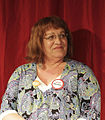Portal:Transgender
Welcome to the Transgender portal Being transgender is distinct from sexual orientation, and transgender people may identify as heterosexual (straight), homosexual (gay or lesbian), bisexual, asexual, or otherwise, or may decline to label their sexual orientation. The opposite of transgender is cisgender, which describes persons whose gender identity matches their assigned sex. Accurate statistics on the number of transgender people vary widely, in part due to different definitions of what constitutes being transgender. Some countries, such as Canada, collect census data on transgender people. Generally, fewer than 1% of the worldwide population are transgender, with figures ranging from <0.1% to 0.6%. Many transgender people experience gender dysphoria, and some seek medical treatments such as hormone replacement therapy, gender-affirming surgery, or psychotherapy. Not all transgender people desire these treatments, and some cannot undergo them for financial or medical reasons. The legal status of transgender people varies by jurisdiction. Many transgender people experience transphobia, or violence or discrimination towards transgender people, in the workplace, in accessing public accommodations, and in healthcare. In many places, they are not legally protected from discrimination. Several cultural events are held to celebrate the awareness of transgender people, including Transgender Day of Remembrance and International Transgender Day of Visibility, and the transgender flag is a common transgender pride symbol. (Full article...) Selected article Portrayals of transgender people in mass media reflect societal attitudes about transgender identity, and have varied and evolved with public perception and understanding. Media representation, culture industry, and social marginalization all hint at popular culture standards and the applicability and significance to mass culture, even though media depictions represent only a minuscule spectrum of the transgender group, which essentially conveys that those that are shown are the only interpretations and ideas society has of them. However, in 2014, the United States reached a "transgender tipping point", according to Time. At this time, the media visibility of transgender people reached a level higher than seen before. Since then, the number of transgender portrayals across TV platforms has stayed elevated. Research has found that viewing multiple transgender TV characters and stories improves viewers' attitudes toward transgender people and related policies. Selected biography Georgina Beyer (b 1957) was the world's first openly transsexual Member of Parliament, and from 27 November 1999 until 14 February 2007 was an MP for the Labour Party in New Zealand. Born George Bertrand in 1957 in Wellington, Māori of Te Āti Awa, Ngāti Mutunga, Ngāti Raukawa, and Ngāti Porou descent, Beyer spent her early childhood on her grandparents' farm in Taranaki. Later she shifted to Wellington to live with her mother, who had subsequently married Colin Beyer, a prominent lawyer and businessman. Shortly after leaving school at Wellington's Onslow College, Beyer discovered Wellington's gay scene, and at the age of 17 realised she was transgender. Did you know (auto-generated) -
This month's birthdays
More did you know...
Random quoteThey can try to ban us. They can try to get rid of our health care. They can try to deny us housing, credit, and public accommodations. They can try to shame us. They can try all they want to erase us, but at some point, they will realize the trans community is never going away. Trans people are everywhere. Every country, every race, every ethnicity, every religion, every socioeconomic level, every period of human history — we are everywhere. We are natural. You can’t rid of what’s natural. I think they know that, and it terrifies them. Related portalsSelected picturesTopics
CategoriesWikiProjects WikiProjects are non-hierarchical peer-run groups which serve as a resource for the communication on, and collaboration of, content within a specific topic area. Related WikiProjects: Things you can do
Associated WikimediaThe following Wikimedia Foundation sister projects provide more on this subject:
|





























